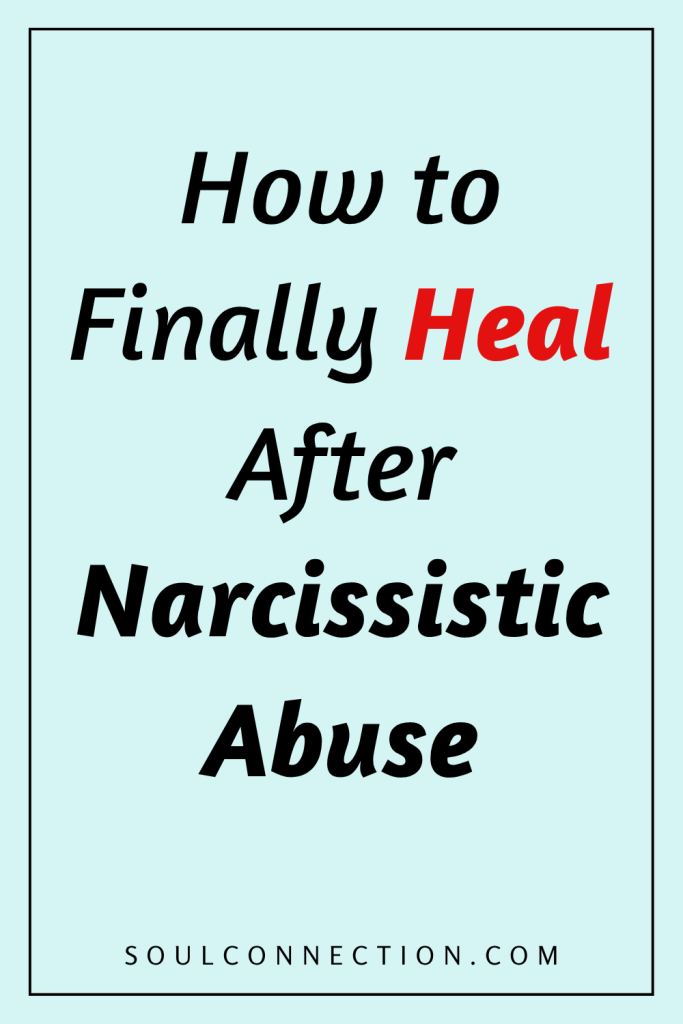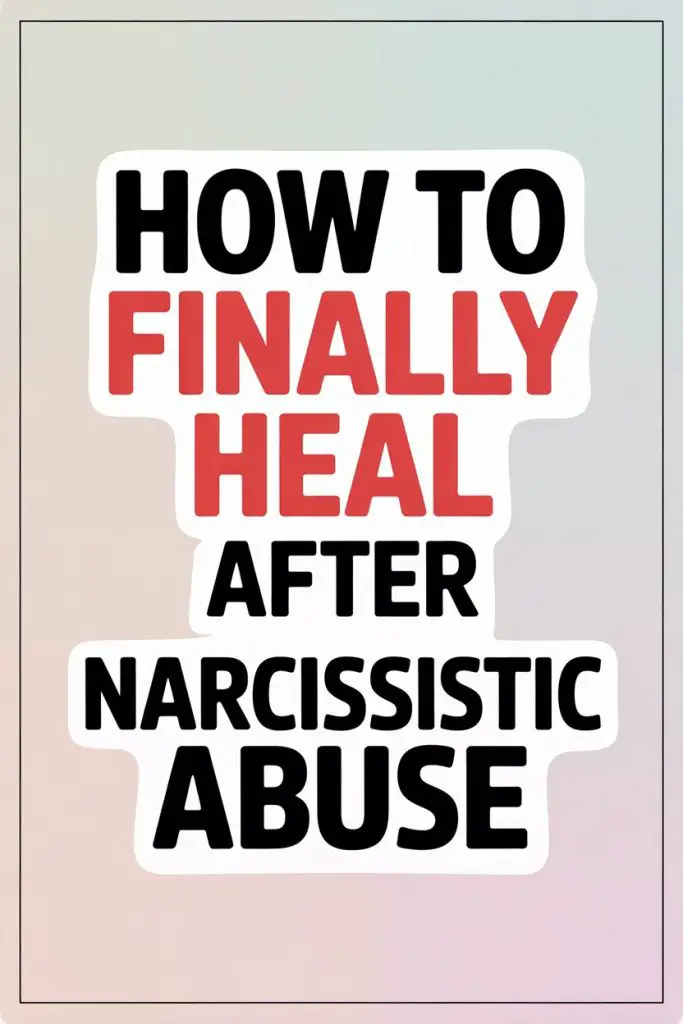Getting out of a relationship with a narcissist feels a bit like escaping from an escape room—except you didn’t sign up for the trauma, the clues are gaslighted into oblivion, and the prize at the end is your own sanity.
The good news? Healing is absolutely possible. The bad news? Your inner voice might need a little retraining after years of someone else using it as their personal karaoke machine.
Ready for the grown-up version of self-care? Here’s how to actually move forward after narcissistic abuse.
Naming What Happened
There’s power in naming. If your last relationship felt like living in a funhouse mirror—where nothing made sense and your self-esteem was stretched and squashed—you’re not imagining things.
Narcissistic abuse is slippery. It rarely comes with obvious scars or a villainous soundtrack. Emotional manipulation, blame-shifting, love-bombing, and good old-fashioned gaslighting are all on the playlist.
Recognizing and admitting that it was, in fact, abuse (no matter how “nice” they seemed on Tuesdays) is the first, slightly nauseating step toward healing.
It doesn’t mean you’re weak. It means you’re done letting someone else rewrite your story.
No Contact Isn’t Just a Trendy Hashtag
Blocking, muting, and deleting can feel both petty and powerful—like you’re in a low-budget action film and your thumb is the hero. But cutting off contact isn’t about revenge. It’s about breaking a cycle.
Narcissists rarely just fade quietly into the background. Expect a few comeback attempts: love bombs, guilt trips, and, if all else fails, inventing fresh drama out of thin air.
Protect your peace like it’s the last biscuit on the plate. Block, delete, repeat.
If co-parenting or work makes total no contact impossible, keep it dry, dull, and direct. Think corporate email, not personal diary.
Relearning Reality
Let’s be honest: gaslighting does a number on your reality filter. You might second-guess your memories, doubt your intuition, or feel like your thoughts have been through a spin cycle. This is normal, if thoroughly unpleasant.
Start with basics. Journal what happened.
Talk with friends who knew you before things got weird. Revisit old hobbies, places, or playlists that remind you of who you are outside of anyone else’s narrative.
Your instincts aren’t broken—they’re just a bit bruised. With time, they’ll come back stronger (and with much better boundaries).
Letting Guilt Off the Hook
Narcissists are world-class experts at the blame game. If you’ve left one, there’s a good chance you’re carrying guilt that isn’t actually yours.
Maybe you feel responsible for the relationship ending, or worse, for how they’re supposedly “suffering” now.
Here’s a hard truth wrapped in a soft blanket: their pain isn’t your fault, their choices aren’t your burden, and you’re not required to explain yourself to anyone who makes you feel small.
Guilt is a sneaky way the narcissist keeps running the show after the credits roll. Show it the door like last season’s fashion.
Therapy Isn’t Just for Hollywood
Therapists are a bit like plumbers: no one thinks they need one until everything’s backed up and there’s water everywhere.
A trauma-informed therapist (bonus points for one familiar with narcissistic abuse) can help you sort out what actually happened, challenge the inner critic you inherited from someone else, and build a new toolkit for boundaries.
Group support—online or in-person—can help too. There’s something deeply validating about sharing your story with people who nod along, not because they’ve read about it but because they’ve lived it.
Rebuilding Trust in Yourself
Abusers are experts at making you doubt your every move. The healing journey means learning to trust your gut again—which, funnily enough, is one area narcissists never want you visiting.
Start small. Choose what to have for dinner. Pick the film. Decide when you want to go for a walk. Say “no” to something tiny. Each decision is a brick in your house of self-trust.
Before long, you’ll be making big choices and trusting yourself like you used to—only now, your boundaries are twice as sturdy.
Setting and Honoring New Boundaries
After narcissistic abuse, “boundaries” can sound like a fancy word people throw around in self-help books. But boundaries are just limits.
What you’ll accept, what you won’t, how you let people talk to you, whether you reply to that 11 p.m. text (hint: you don’t have to).
Practice boundary-setting with low-stakes people. That chatty co-worker who wants to tell you their cat’s medical history during your coffee break? Now’s your chance.
“Sorry, I can’t chat right now.” If you can handle that, you can handle anyone.
Redefining Your Self-Worth
Narcissists tend to run a self-worth demolition derby—repeatedly hitting your confidence until you think the best you can do is settle for crumbs.
Time to build a new definition of self-worth, one where you’re the builder, decorator, and occasional party host.
List what you like about yourself. (Seriously, write it down. No one’s watching.) Remind yourself daily. Find new interests, revisit old ones, and celebrate every little win.
Self-worth isn’t just liking yourself on the good hair days. It’s knowing you deserve respect, love, and peace, just because you exist.
Accepting Grief Without Judgment
Ending any relationship brings grief, but leaving a narcissist can come with a special blend of sadness, relief, anger, and, if you’re lucky, a tiny bit of schadenfreude.
Grieve the good times, the hopes you had, and the person you thought they were.
Don’t rush the process. Some days will be better than others. Ugly crying is not only allowed but encouraged. The only rule? Don’t let nostalgia trick you into reopening the door. Blocked means blocked.
Trying On New Relationships
When you’re ready, dating after narcissistic abuse can feel like walking through a funhouse—you expect monsters around every corner. Give yourself permission to go slow. Trust your new boundaries and instincts.
Notice red flags, but also look for green flags. (Someone who apologizes when they mess up? That’s not a unicorn; that’s healthy.) Most importantly, keep your own happiness front and centre.
The right person will add to your life, not make you audition for it.
Moving Forward at Your Own Pace
Healing isn’t a race and there’s no medal for getting over narcissistic abuse the fastest. Some days you’ll feel strong enough to give a TED talk; others, you’ll want to hide with a packet of biscuits and reruns of reality TV.
Both are allowed.
Measure your progress by the moments you say “no” without guilt, trust your gut, or laugh at something silly without checking if it’s allowed. Each of these is a tiny rebellion against the rules of your old relationship.
Over time, those tiny rebellions stack up until you’re living your own life again, on your own terms.
Healing Is Messy, But Worth It
No one escapes narcissistic abuse without a few emotional scars, but scars are reminders you survived. They mean the story didn’t end where the narcissist wanted.
Healing is messy, non-linear, and doesn’t come with a neat bow. But it’s also real, possible, and a thousand times better than living in someone else’s funhouse.
Take your time. Celebrate the little victories. You’re not who they said you were.
You’re so much more.


